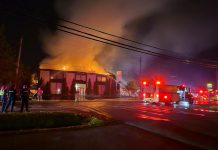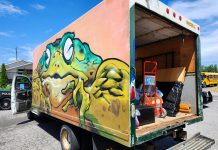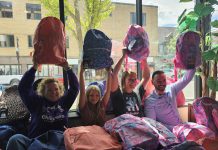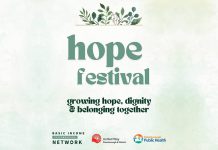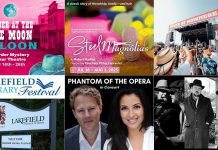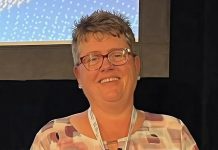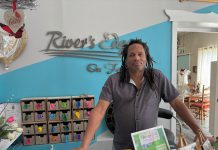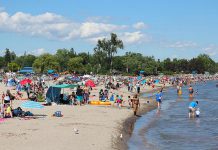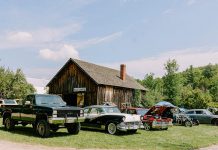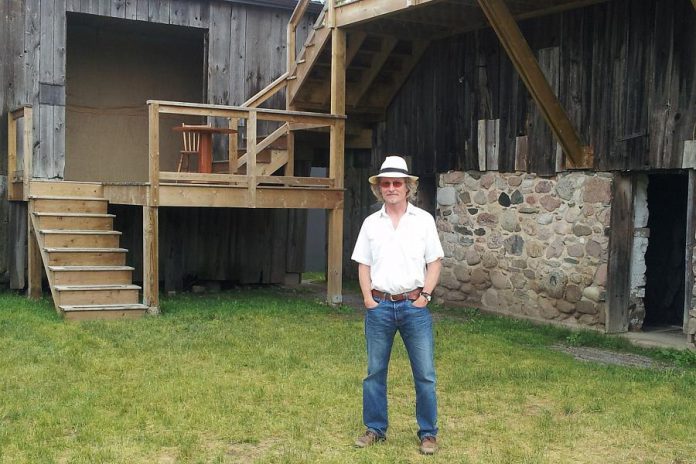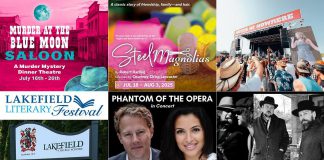The drive down Zion Line, just minutes away from the main streets of Millbrook, is like driving through a scenic time tunnel. Tall trees line the road, creating a canopy of leaves like a covered bridge, which cuts through green fields that sprawl as far as the eye can see. It’s the perfect journey to mentally prepare visitors for Winslow Farm, the location of the nationally renowned 4th Line Theatre. Home to artistic director Robert Winslow, 4th Line Theatre has been welcoming audiences for 23 seasons with its unique brand of outdoor historical dramas.
“Historical dramas are our mandate,” Robert says. “Our first mandate is to preserve and promote our Canadian historical heritage through the development of regionally based, environmentally staged historical dramas. That very wordy mandate is still in play. We have to be answerable to some degree of that.”
It is impossible to be a part of Peterborough’s cultural circles without knowing the name Robert Winslow or 4th Line Theatre. One of the region’s most celebrated theatrical destinations, 4th Line Theatre has helped put Peterborough on the cultural map. But it takes a lot of effort to become recognized outside of your own community.
“There are so many theatre companies in Peterborough, but to get known beyond your community is really tough,” Robert explains. “We were fortunate that there were certain factors from the beginning — the farm, the mandate, the way the plays are presented in an outdoor setting, the involvement of the community — that allowed us to not just get covered by entertainment news, but by national news.”
“It’s amazing what you have to do to get people outside of our community to look at us,” he adds. “It’s rare that media from Toronto will come to Peterborough to look at a production. They should, because the talent is here. They are going to Stratford or Shaw or the Toronto Fringe Festival, but they won’t come to Peterborough.”
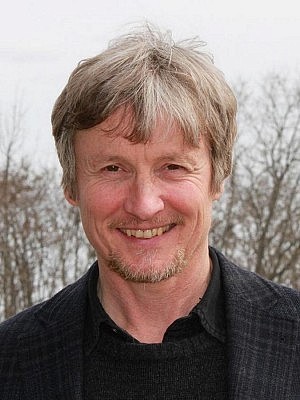
However, it was back home where he’d find his greatest success with 4th Line Theatre. Robert inherited Winslow Farm, in his family since the 1880s, in 1990 and converted it to a unique outdoor theatre space that opened to audiences in 1992.
When CBC’s The Journal did a documentary on 4th Line Theatre’s premier production, The Cavan Blazers, the national coverage got 4th Line Theatre up and running immediately out of the gate. However, Robert explains that maintaining the momentum of success was a bigger challenge than opening the theatre.
“We were going to run two weekends in late August, but we extended it to five weekends into late September,” he says. “Then we had to figure out what we’d do next. We came up with a show about Suzanna Moody and Catherine Parr Trail. Then we started to listen to people who had stories about local history. It just proliferated from there.”
In fact, it was by listening to an audience member after a performance of The Cavan Blazers that Robert got the idea for his wildly successful play Doctor Barnardo’s Children.
“In 2001, after a production of The Cavan Blazers, a gentleman came up to me who was connected to the Trillium Foundation,” Robert recalls. “He started talking about his mother and how she never could express emotion towards him. I asked him what he meant and he told me she was a Barnardo girl.”
Intrigued, Robert visited The Barnardo Hazelbrae Memorial Group, a Peterborough-based group supporting the families of former Barnardo children. The group is named after the home for girls that was established in Peterborough by Dr. Thomas Barnardo. Nearly 9,000 girls entered through the Hazelbrae home between 1884 to 1923, while boys were scattered throughout the Kawarthas where they worked as farm hands. The Hazelbrae home was located on what would eventually be known as Barnardo Street, aptly named after Dr. Barnardo. Robert’s visit to this group helped him develop Doctor Barnardo’s Children.
“I went to the Hazelbrae Group and I started hearing stories from the members,” Robert says. “Nearly 9,000 girls came through that home, and many boys also came through this area. Can you imagine how many descendants there are of these people in Ontario? It’s massive.”
Doctor Barnardo’s Children first debuted in 2005 and immediately sold out before the first performance. The show proved so popular that 4th Line presented it again in 2006, with more sold-out performances. This summer, 4th Line did another revival of the show, with sold-out performances once again. As Robert explains, it’s an important part of Canadian history that’s just now being recognized and written about. The 4th Line Theatre production has played a big part in bringing the stories of the Barnardo children forward to the public.
“When I was interviewing former Barnardo children 10 or 11 years ago, they never even talked about their past to their family,” Robert explains. “In some cases, husbands or wives didn’t even know about their spouses’ background. It’s a big part of our Canadian history, but it hasn’t been well known until the last couple of decades. Many of the people involved didn’t talk about their background because they felt ashamed of it.”
“They were little kids, separated from their family and put into orphanages or institutions and then they were brought over to Canada on their own,” he continues. “They sounded funny because of their accents and they tended to be smaller than the average Canadian due to bad diet. They were not treated well most of the times. They were worked hard and treated as hired hands. They were not treated as family; they were treated like slaves. So it wasn’t the kind of thing that people went around saying they were proud of being.”
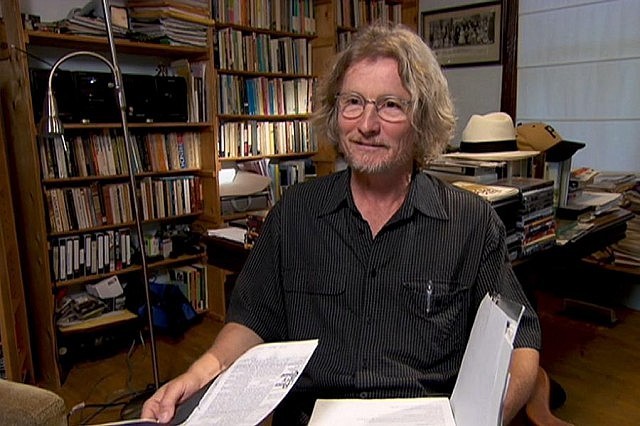
This August, Robert debuts his latest play, Wounded Soldiers, a sequel to Doctor Barnardo’s Children. The new play continues to follow the life of hero Billy Fiddler, who returns to England to fight in World War I. Robert explains that World War I was a perfect next step for his Barnardo characters.
“I learned that a lot of former Barnardo children fought in World War I,” he says. “There was a spike in kids who came to Canada from 1904 to 1906, so by 1914 many of them were old enough to fight. Many of them were loyal to England and so they went back. So I thought that it would be an interesting story to follow a Barnardo boy who would go back to England and fight in the war.”
In Wounded Soldiers, Billy Fiddler is reunited with Johnny Singer, a minor character from Doctor Barnardo’s Children who has cerebral palsy. Actors Griffin Clark and Sean Towgood reprise the roles of Billy and Johnny in the original 2005 production of Doctor Barnardo’s Children. Towgood, who has cerebral palsy in real life, helped inspire Robert to write the production.
“When we first debuted Doctor Barnardo’s Children, Sean was 12 years old,” Robert says. “When I was researching the play, I found out that the Barnardo Foundations were some of the first agencies to take in physically disabled children and help them. In Wounded Soldiers, Sean’s character is in what was called an ‘idiot asylum’. Many of these asylums were taken over by the war department for the treatment of wounded soldiers. Billy Fiddler is being treated for post-traumatic stress disorder, the two characters reunite, and Johnny helps Billy with his affliction.”
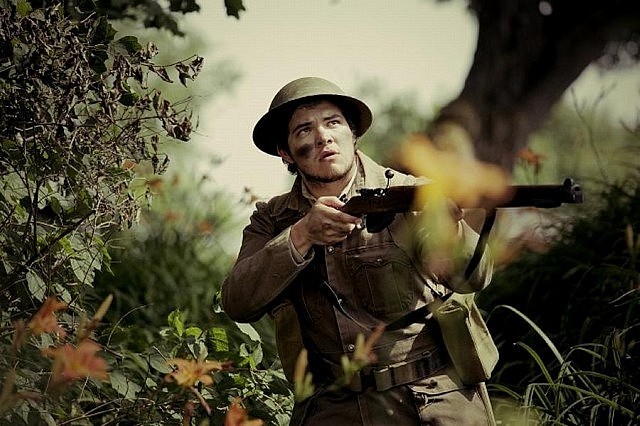
“There is potentially a third play in the Barnardo series,” Robert points out. “It would take a look at Billy Fiddler in the 1930s, riding the rails and trying to survive in his twenties … the struggles that he faces.”
Robert also has a few other interesting ideas for upcoming shows, including a look at the role of alcohol in our culture.
“One thing I’m working on right now is called The History of Drinking in Cavan,” he says. “It looks at alcohol as part of our culture from 200 years ago until today. It weeds through some issues with alcohol in my own family. It tells some things that happened to me. It’s kind of sociological, but it’s also personal. Alcohol can be a funny subject, but it can be a very difficult one. It can have a big effect on a lot of people. Not just the one involved, but the entire family.”
Robert is also going far back into his family roots, where he plans to move away from Canadian history and develop a production based on his Saxon heritage in Europe.
“I’ve been doing research on my family as far back as the eighth century in England, when they were part of the Saxon immersion in Britain,” he explains. “The idea is to create a Saxon village circa the eighth century and look at the way that they live together and their relationship with outsiders. A Celtic outsider arrives in the Saxon village and is considered to be dangerous. The story is still in development, but I like doing stories that take the environment we have and change it into something else.”
Although seemingly far removed from 4th Line Theatre’s traditional productions that focus on local history, Robert’s idea for a Saxon show has a lot more tied in connection to the Kawarthas then one might think.
“So much of what we have in our culture in Cavan can be tracked back to the Saxons,” he says. “The way that we farmed and the buildings that we built is not so different than it is now.”
Continuously researching, writing and developing bold new theatrical works about our culture, Robert Winslow has helped share the stories of our community to the rest of Canada and beyond. His intelligence and innovation, backed by a unique and beautiful theatre space, has ensured his continued success — a true gift to Peterborough and the Kawarthas.


